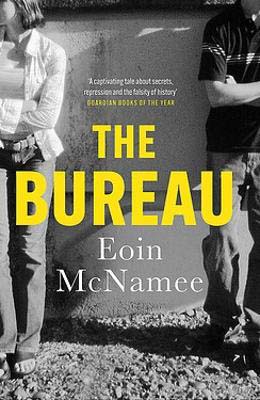- Opinion
- 10 May 25
Eoin McNamee: "That was a private dread, but if you spread it out, there was a kind of public dread of living along the border"

Northern Irish crime author Eoin McNamee on his gripping new novel The Bureau, James Ellroy, and the cult movie adaptation of his book Resurrection Man.
Set in ’80s Newry, Eoin McNamee’s latest novel, The Bureau, focuses on gangster Paddy Farrell and his mistress Lorraine, doomed lovers enmeshed in the murky world of border crime and Northern politics, including the titular business. An additional layer of fascination comes from McNamee’s father, Brendan, being a character in the story, with much of the narrative detail lifted from his life.
“It’s all factually based,” explains the softly spoken McNamee, sitting in the Oscar Wilde Centre in Trinity College, where he serves as director. “That was my father’s business after he was made bankrupt as a solicitor – he started up this maverick business in Newry, it was the kind of thing he was good at. But when you look back, some of it was horrendous, particularly when he went bust the second time.
“There was money missing and my brother was abducted, all this stuff. We lost our house, and there was a lot of fear and dread around. I said to myself I couldn’t write about it, because I couldn’t find a way into it. Then when I finished the book, I realised that in actual fact, I didn’t want to go near the trauma of it.”
As the author explains, his screenwriting work opened up an unexpected route into the story.
“What happened was that one day, I was doing a writers’ room for a Netflix show, Vikings: Valhalla,” McNamee recalls. “I was having coffee one day with one of the producers, Liz Gill. I was telling her some of the stories and she said, ‘That sounds like ‘The Sopranos’.
“For some reason, that gave me a way into it. I didn’t know what that was really, but when I finished the book, I realised it was the characters. Because The Sopranos is really about the characters, and it was the characters that led me into this.”
Given the painful travails of his father’s life, it must have been very draining to live through.
“Well, you had the resilience of being young,” considers McNamee. “But yes, when I look back, I don’t know quite how my father handled the pressure, or if he ever did. I think it kind of broke him. For us, it was draining. People who live with an alcoholic, or an abusive person or whatever, know when you hear the key in the door in the evening, the house goes into hyper vigilant mode. There’s a dread. It’s analogous to that, because my father was an alcoholic.
“That was a private dread, but if you spread it out, there was a kind of public dread of living along the border. It was the same atmosphere, the same hyper vigilance – one went into the other.”

Adding to the intrigue of his father’s story was that it also peripherally involved notorious INLA head, Dominic ‘Mad Dog’ McGlinchey, who features as a character in The Bureau.
“Years after my father died, I started to pick this thing apart,” says Eoin. “There was a robbery of American Express cheques, which as far as I can figure out, ended up with my father, through another border contact. I think McGlinchey carried out that robbery, so that was the connection. Then my father chased the cheques and he had to sue American Express. I didn’t know about this until I was told years afterwards.
“He sued American Express in the High Court in Belfast, cos they wouldn’t pay out, and then they had to.”
Further contributing to the meta dimension of the story, the author himself also makes an appearance.
“There’s a kind of composite character, Owen, spelled with an ‘O’,” notes McNamee. “It’s myself and my brother. We were both in and around, working in this place, and had a lot to do with it. But with the second big bust, the guys came looking for their money. There was a rumour going around that I was in Spain, stashing cash. In actual fact, I was on top of a mountain in Spain, incommunicado, cos it was a place with no electricity. I was trying to write poetry!
“So they came looking for me and couldn’t find me. Then they bundled my brother in the back of a car, and brought him up to south Armagh or north Louth somewhere. He was sitting in a barn with a bag over his head, being interrogated. When you tell it, people look at you and go, ‘You don’t often get back from that.’ But they let him go. I’d say there was pressure brought to bear on certain business interests – that’s what I was told afterwards.
“They obviously turned around and said, ‘Look, the game’s not worth the candle here – let him go.’ The way they let him go was, they ran him through fields, clinging onto the back of a pick-up at night, with a bag over his head to disorientate him. Then they dumped him somewhere.”
Gritty and compelling, The Bureau is told in a stripped back, hard-boiled noir style. Among Down native McNamee’s early influences as a crime writer was US heavyweight James Ellroy, author of classics such as LA Confidential, American Tabloid and The Black Dahlia.
“He hated the LA Confidential film, didn’t like it at all,” says McNamee. “I remember talking to his agent, Nat Sobel, and he told this story about the editing of that book. They had everything up on a board, and it wasn’t tight enough or whatever. They just started chopping words of out it, and chopping up sentences, until they got that telegramatic style, and they went, ‘That’s it.’ I did a public interview with Ellroy, up in the big state room in Dublin Castle.
“We were sitting downstairs, and Ellroy said, ‘Look Eoin, you go and introduce me, and I’ll get up and do my schtick.’ But he was giving out about the size of the crowd. He said, ‘I’m not making any fucking money, and you’re not making any fucking money!’ (laughs) I said, ‘I’m not making any money anyway James!’”

Eoin McNamee. Photo: Abigail Ring
Now in his sixties, McNamee first came to wide attention just over 30 years ago with Resurrection Man, about the loyalist gang the Shankill Butchers. In 1998, the novel was adapted into a film starring Stuart Townsend, which became a favourite of Trainspotting author Irvine Welsh, and also served as the composing debut of David Holmes.
These days, Resurrection Man is regarded as one of the great Irish cult films, though as Eoin notes, it got a rough media reception upon its release.
“The film got attacked a lot,” he reflects. “There were death threats and all the English press were down on us. They were saying we were IRA apologists and all this sort of stuff. To be honest, it brought me right back to the time of what happened with my father. Anyone who’s subject to a media pile-on, I always feel sorry for them, no matter how much they deserved it. Because you’re just run over by a truck and that’s what happened to us.
“It’s now referred to as ‘the legendary Resurrection Man’, but people were sticking the UVF on us and stuff like that. When I made it, I never thought it would be a mainstream film. I thought it would go kind of arthouse, because that’s what it was. But we had an incredible cast and crew, and the music was brilliant.
“Myself, the director and the producer met up in London a good while ago for the 20th anniversary. We all said, ‘If any of us had have known what we were doing, it would have been a much worse film!’”
The Bureau is out now.









